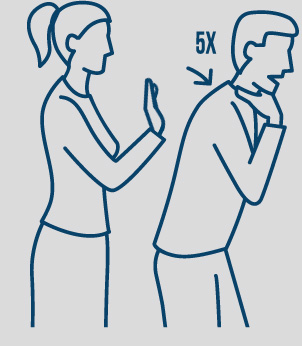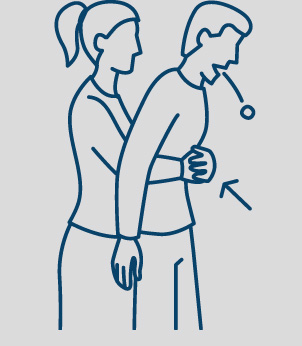
Dysphagia
Dysphagia (difficulty or discomfort in swallowing) is a common symptom in HD. The automatic coordination of bringing food to the mouth, chewing, forming a bolus and swallowing, while simultaneously inhibiting breathing, breaks down. Food may spill from the mouth.  People with HD may inadequately chew foods, and commonly add more mouthfuls of food before swallowing. Poor coordination may lead to frequent choking on liquids and on solid food. Aspiration of liquids or food may lead to pneumonia or even to death by choking.
People with HD may inadequately chew foods, and commonly add more mouthfuls of food before swallowing. Poor coordination may lead to frequent choking on liquids and on solid food. Aspiration of liquids or food may lead to pneumonia or even to death by choking.
A speech-language pathologist should assess the individual with dysphagia periodically and suggest adaptations that will improve swallowing and minimize choking. Eating slowly, avoiding distractions during mealtime, adjusting food textures and using adaptive equipment are all helpful in reducing choking. Family members should be taught the Heimlich maneuver.
How to Perform the Heimlich Maneuver
Determine whether you need to perform abdominal thrusts. If a person who appears to be choking is conscious and coughing, they may be able to dislodge the object on their own. Administer first aid if the person is:
- Not coughing
- Unable to speak or breathe
- Signaling for help, typically by holding their hands around their throat
First, if there’s a bystander, have them call 911 (or your local emergency phone number) for emergency help. If you’re the only person present, begin first aid treatment:
1. Get the person to stand up.
2. Position yourself behind the person.
3. Lean the person forward and give five blows to their back with the heel of your hand.
4. Place your arms around their waist.
5. Make a fist and place it just above the navel, thumb side in.
6. Grab the fist with your other hand and push it inward and upward at the same time. Perform five of these abdominal thrusts.
7. Repeat until the object is expelled and the person can breathe or cough on their own.
Alternatively, if the person can’t stand up, straddle their waist, facing their head. Push your fist inward and upward in the same manner as you would if they were standing
Seek medical attention afterward. This is to ensure no physical damage has occurred to their throat and airways.

FIVE BACK BLOWS

FIVE ABDOMINAL THRUSTS
Maintaining Hydration and Nutrition
Most people with HD can be maintained on oral feeding throughout the course of the disease. In later stages, the loss of coordination of oral and pharyngeal muscles will require slow, careful feeding of pureed foods, and beverages will need to be thickened with Thick-It® or related agents to reduce choking. Nutritional needs can be met by liquid supplements alone for some individuals. In some cases, swallowing is so impaired that people with HD suffer hunger, thirst and severe unwanted weight loss. Gastrostomy tubes placed by percutaneous endoscopy or interventional radiology can provide palliation of suffering and afford maintenance of hydration and nutrition in late-stage disease. A discussion around the issue of tube feeding should be held while the individual is still able to express his or her wishes either informally or in an Advance Directive.
Please Note: All of the above articles, presentations and resources are for informational purposes only. HDSA encourages all to consult with their primary care provider, neurologist or other healthcare provider about any advice, exercise, medication, treatment, nutritional supplement or regimen that may have been mentioned anywhere on this site.

